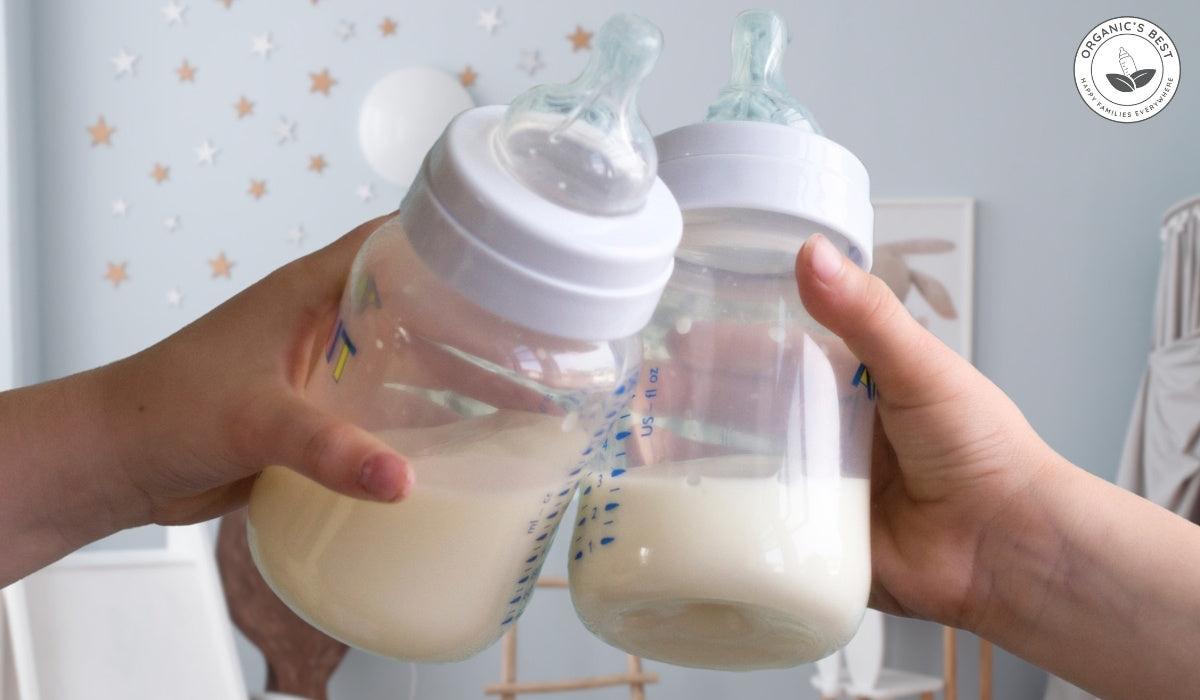Click to Get 2 FREE Boxes/Cans
Only New Customers! Click HERE to Get 2 Extra Boxes/Cans for Free With Your First Order.
BABY FORMULA
Offering new parents top-quality European infant formula from renowned brands like HiPP, Holle, Kendamil, and more. If you’re uncertain about which product to choose, our Formula Finder can help you make the best decision for your baby.
Baby Food
Offering new parents a premium selection of European baby foods, including jars, pouches, cereals, and snacks from esteemed brands like HiPP and Holle.
The Differences Between Soy Formula and Hypoallergenic Formula
by Agustina Fernandez February 15, 2021 12 min read

Baby formula is fed to babies as a supplement or replacement for human breast milk. The standard formulas are usually made from cow's milk, and there are specialty formulas that are made for babies who are allergic or have an intolerance to milk. Pediatricians often prescribe hypoallergenic and soy formula to babies who have a milk protein allergy, and sometimes babies who have a strong family history of allergies.
Some of the common symptoms of allergies include a runny nose, eczema, diarrhea, wheezing, and extreme irritability. These symptoms can range from mild to severe and can sometimes even be life-threatening.
Research has shown that only 2% to 3% of babies have milk allergies. While there are many types of special formulas, this article will focus mainly on hypoallergenic formula and soy formula.
Always remember to consult with your pediatrician before you go for either soy formula or hypoallergenic formula.
Table of Contents
- Reasons to choose soy or hypoallergenic formula
- Soy baby formula
- When should you use soy formula?
- Concerns about using soy baby formula
- Using Soy-based Formula For Colic
- Severe Reactions To Soy Protein
- Soy formulas in Europe
- Hypoallergenic formula (Protein Hydrolysate Formula)
- When Can You Use Hypoallergenic Formula?
- Conclusion on Soy and Hypoallergenic Formula
Reasons to Choose Soy or Hypoallergenic Formula
Parents opt for hypoallergenic or soy formula because they contain alternative nutrients that their babies may tolerate better than the proteins or carbohydrates that are contained in cow's milk. It is important that parents consult with their babies' pediatricians before settling for either of these formulas. Depending on each baby's individual needs, parents will be advised to use the formula that suits them best.
Both formulas have their own benefits and setbacks. However, in general, these formulas are given to babies who have a problem digesting cow's milk. These babies should have been formally diagnosed with either allergies or lactose intolerance and given a recommendation from a pediatrician on which kind of baby formula is suitable for them.
Lactose Intolerance vs. Dairy Allergy
But before we get further into this discussion, did you know that lactose intolerance is not the same as milk allergy? It is common for these two terms to be used interchangeably in daily conversations.
It is important that you understand the difference between lactose intolerance and milk allergy when choosing the most appropriate type of formula for your baby. Milk allergy and lactose intolerance may indeed have overlapping symptoms, but they are, in fact, very different. Not all children who have a milk protein allergy are lactose intolerant, and vice versa.
Lactose intolerance is a digestive problem that may cause discomfort but will not trigger a life-threatening reaction like anaphylaxis. The symptoms of lactose intolerance can be mild or severe, depending on the amount of lactose consumed and the tolerated amount.
An allergy, on the other hand, might trigger severe symptoms and can cause anaphylaxis. To this end, it is important to note that both soy and hypoallergenic formulas have their places, and they cannot always be used interchangeably.

Soy Baby Formula
Soy baby formula is made from soybean protein. Soy protein-based formula is fortified by adding vitamins and minerals, including iron and zinc, to provide the required nutrition for babies. They do not contain cow's milk protein because it is mainly plant-based. For this reason, many parents use soy protein formula for babies with cow milk allergies. Many parents also switch to soy formula when they observe colic, gas, or fussiness in their babies. But are these the right reasons to switch to a soy protein formula?
This article will discuss soy formula in more detail and determine whether soy is a good option for babies who are intolerant to lactose or whether it helps relieve colic as commonly believed.
When Should You Use Soy Formula?
Use In Babies With Lactose Intolerance
Soy protein-based formula is most beneficial for infants who are congenitally lactose intolerant. Some babies have digestive systems that are unable to digest lactose in milk. Lactose is the sugar that is found in milk and other dairy products.
When you eat food that contains lactose, the lactose is broken down into simple sugars, glucose, and galactose in the small intestines. When there is a lack or deficiency of the enzyme lactase in the small intestines, lactose cannot be digested or absorbed.
The unabsorbed lactose causes discomfort to the baby, resulting in severe diarrhea, and the baby is at risk of suffering from severe dehydration and weight loss. In such cases, your doctor will likely tell you that it's necessary to feed your baby using soy-based formula.
Use For Babies With Secondary Lactase Deficiency
It is also often recommended for babies who develop temporary lactase deficiency after suffering from an intestinal infection. It is possible for lactose intolerance to occur temporarily in children.
This is especially common after a viral infection and conditions that lead to inflammation of the intestines, like celiac disease. This explains why sometimes your doctor will ask you to avoid milk that contains lactose when your baby has a stomach bug.
In a study comparing human milk, cow milk-based formula, and soy protein-based formula, there was no difference in the rate of recovery from rotavirus or non-rotavirus diarrhea using nutritional therapy. However, the study observed that for infants who receive soy-protein-based formula, the duration of diarrhea was shorter.
Use For Vegetarian And Vegan Families
Soy protein-based formula is often preferred by vegetarian parents who wish to raise their babies as vegetarians, too. However, the American Academy of Pediatrics cautions against the use of soy-based formula, unless a pediatrician recommends it.

Concerns About Using Soy Baby Formula
There are reservations about phytates that are found in soy-based formulas. According to the National Institute of Environmental Health Sciences, the phytates bind essential minerals like calcium, phosphorus, iron, and zinc that the baby needs for growth.
For this reason, soy-based formulas are often fortified with iron and zinc to improve their quality. Soy-based formulas often have 20% – 30% more calcium content than milk-based formulas to prevent calcium deficiencies and consequent deficiencies in bone mineralization.
It is worth noting that more research needs to be done to study the iron and zinc contents in soy-based formula. This is because companies like Isomil's Soy Formula, made by Ross Laboratories, do not add more iron to their soy protein-based formula than their cow milk formulas. They conducted a study that found that the blood mineral profile of babies fed on soy was no different from that of babies fed on cow's milk formula.
Use For Babies With An Allergy To Cow's Milk
According to the American Academy of Pediatrics Committee on Nutrition, 10% to 14% of infants who are allergic to cow's milk are also allergic to soy. For this reason, soy is not always the best option for babies who are allergic to cow's milk protein because there is a chance that they are also allergic to soy protein. Mothers of children who have clinically diagnosed allergies to cow's milk are usually recommended to use a hydrolyzed protein formula instead.
Use In Term And Pre-Term Babies
While research has proven that soy baby formula is safe for term babies, it is not recommended for pre-term babies. Several studies have recorded normal growth and development in term babies who are fed on soy-based formula. However, research has shown a higher rate of osteopenia in pre-term and underweight babies who are fed on soy-based formula.
Osteopenia is a condition characterized by weak bones. This is because soy formula contains higher levels of aluminum compared to breast milk and cow's milk-based formulas. This aluminum competes with calcium for absorption. There are cow milk-based formulas on the market that are designed for pre-term babies. These are generally recommended over soy-based formulas as they don't carry the same risk of osteopenia that soy formulas do.
Using Soy-Based Formula for Colic
Many parents switch to soy protein-based formula because they believe it will help relieve colic for their babies. However, there is no evidence showing that soy protein-based formulas help relieve colic. The Committee on Nutrition of the American Academy of Pediatrics recommends against the use of soy-based formulas in the routine management of colic because there is no evidence that soy-based formula helps relieve colic.
Severe Reactions to Soy Protein
As with cow milk protein, several studies have documented severe reactions to soy protein-based formula. Several studies have reported inflammation of different parts of the gut resulting in malabsorption. Suppose your baby reacts to soy-based formula as well as cow milk-based formula. In that case, it is advisable that you switch to hydrolyzed protein formulas, of course, in consultation with your pediatrician.
Phytoestrogens In Soy Baby Formula
Research by the National Institute of Environmental Health Sciences suggests that girls who are fed on soy-based formula when they are infants are more likely to suffer severe menstrual pain in adulthood. This is associated with the fact that soy contains phytoestrogen that has an impact on the reproductive system while the babies develop. Phytoestrogens are compounds that are found in beans and other legumes and have the ability to act like the hormone estrogen in the body.
Other Concerns
Soy-based formulas contain 33% more sodium than the standard cow's milk-based formula. This is a very high amount of salt for babies, as formulas generally are saltier than breastmilk. For this reason, it is not wise to give soy formula unless it is medically necessary.
Some other concerns around soy formula include the issue that soy proteins lack some amino acids that are crucial for the development of the baby. With improved research, some amino acids are added to some formula brands.
If you are concerned about the safety of giving your baby soy formula, then it's best to consult your doctor! It is important to note that after careful investigation in animals, adult humans, and infant populations, experts have expressed minimal concern that soy protein formula may adversely affect human development, reproduction, or endocrine function.
Furthermore, all baby formulas sold in the USA are reviewed by the FDA to ensure that they are appropriate for babies in terms of composition, purity, and nutrient content. This means that soy-based formula is safe to use for your baby. However, the health agencies say that soy-based formula should only be used for children who need it. The rest of the children should be fed cow's milk-based formulas for optimal nutrition.
Soy Formulas in Europe
European authorities advise against the use of soy formula, unless medically necessary. This is due to the previously mentioned levels of phytoestrogens, which can act similarly to estrogen and can negatively influence the absorption of minerals.
Since the influence of a higher isoflavone intake on babies has not yet been fully analyzed and clarified, but may have effects on reproductive organs and the immune system, for precautionary reasons, European authorities and the Nutrition Committee of the German Society for Pediatric and Youth Medicine discourage the use of soy formula.
Exceptions should only be made if it is necessary due to medical reasons (e.g., lactase deficiency) or if parents reject cow's milk-based infant formula due to ethical or religious reasons (however, a pediatrician should be consulted first).
Hypoallergenic Formula (Protein Hydrolysate Formula)
Hypoallergenic formula is made from cow's milk. Although they are made from cow's milk, these formulas are processed in such a way that the allergy-causing protein is broken down into smaller compounds that the baby can more easily digest. The process of breaking down protein into smaller particles (hydrolysis) makes the formula less likely to cause allergies.
Types Of Hypoallergenic Formula
These formulas can either be extensively hydrolyzed, partially hydrolyzed, or an amino-acid-based formula.
Extensively hydrolyzed formulas are those that have broken down the cow's milk protein into small compounds that are more easily digestible.
Partially hydrolyzed formulas, on the other hand, break down the cow's milk proteins into larger pieces compared to extensively hydrolyzed formulas. Partially hydrolyzed formulas might help relieve fussiness and gas in some babies, but they might not be good for babies who are allergic to cow's milk, as they might still trigger allergies. This means that babies who are very sensitive to cow's milk are usually better off using extensively hydrolyzed formulas or amino-acid-based formulas.
Amino-acid-based formulas do not contain any whole protein molecules. They are made of basic amino acids. Amino acids are the building blocks of proteins. They are used when babies are sensitive, even to hydrolyzed formulas. Amino acid-based formulas are the most expensive, but sometimes they are necessary for the well-being of the baby.

When Can You Use Hypoallergenic Formula?
Pediatricians typically recommend this formula for babies with a documented milk protein allergy. Extensively hydrolyzed formula tends to be the best for babies who have milk allergies. Some of these children also tend to have a soy protein allergy, and therefore, they cannot take soy-based formula.
Always remember to consult your pediatrician before you go for this type of formula or any specialty formula. For children who are sensitive to extensively hydrolyzed formulas, amino acid-based formulas are often recommended.
There is growing concern over the sources and processing of food. As there is a growing preference for organic baby food and other organic products, the same goes for organic formulas. Parents who are concerned about their babies ingesting pesticide residue or other chemicals that might slip into the formula during manufacturing often insist on buying organic formula.
Nutritionists have been known to recommend organic formulas for babies with compromised immunity or endocrine dysfunction. Organic formulas are made using certified organic ingredients and processing aids. Organic formulas are GMO-free, and they usually have to comply with the national list of allowed and prohibited substances. This means that certain preservatives and additives that are usually contained in standard formulas cannot be used in organic formulas.
The FDA requires that formulas have certain nutrients and preservatives, which can only be created synthetically. Examples of these nutrients include lutein, lycopene, nucleotides, taurine, and L-Carnitine. It is worth noting that some of these ingredients are accepted in the US but are banned in Europe. Experts have advised choosing a formula that is as close as possible to the nutritional profile of breast milk.
HiPP Hypoallergenic Formula
HiPP is a German baby formula manufacturer with many decades of experience. It is very popular with European parents and is gaining increasing popularity in the US and Canada as well.
HiPP Hypoallergenic Formula is a popular choice if you are looking for a hypoallergenic formula. It contains important prebiotics, omegas 3 and 6 for healthy brain development and immune function, as well as various other vitamins and minerals. It does not contain any added sugar or GMOs.
Hypoallergenic formulas, unfortunately, do not qualify for organic certification because of the broken-down milk proteins.
To learn more, also check out: The Best Hypoallergenic Baby Formulas
Homemade Infant Formula
Because of the high cost of organic formulas or other reasons, some mothers resort to making organic homemade formula for their babies. However, the American Academy of Pediatrics strongly advises against homemade formulas.
According to the American Academy of Pediatrics, it is important for the health of your baby that you give your baby formula that meets the FDA's minimum safety and nutritional standards and that is prepared using safe procedures. Homemade formula may seem cheap and healthy, but it's not safe and does not meet the nutritional needs of your baby.

Drawbacks of Hypoallergenic Formula
- Cost
Hypoallergenic formulas are the most expensive compared to soy and cow milk formulas. This might make it difficult for many families to afford to sustain a baby on hydrolyzed formula. Luckily, some insurance coverage will help purchase these formulas if there is medical evidence that the baby requires them.
- Unpleasant Taste
As a result of the intense processing that it undergoes to break down the proteins, the formula can have an unpleasant taste. For this reason, a lot of brands add sugar and cornstarch to make it taste better. These sugars might not be the very best for babies. However, HiPP HA formula has been praised for its appealing taste, and it only contains lactose as a natural source of carbohydrates, which offers a mild sweetness. Hypoallergenic formula should only be used if recommended by a pediatrician.
Conclusion on Soy and Hypoallergenic Formula
In general, health agencies advise that babies be breastfed, but if that is not possible, then milk-based formula is the next best option. However, babies with clinically diagnosed allergies to cow's milk protein tend to do better taking extensively hydrolyzed formulas at the advice of their doctor.
An extensively hydrolyzed formula is made from cow's milk, in a process that completely breaks down the protein molecules into smaller pieces that can be more easily digested and are less likely to trigger allergies for the baby.
On the other hand, babies who are intolerant to lactose due to conditions like galactosemia or lactase deficiency can be fed on soy-based formulas, if advised by a pediatrician. Throughout this article, some major differences between soy formulas and hypoallergenic formulas are highlighted.
Firstly, soy protein-based formulas are made from soybeans and therefore contain plant protein. In contrast, hypoallergenic formulas are made from cow's milk in a process that predigests the cow's milk protein. Secondly, soy baby formula contains higher levels of aluminum than hypoallergenic formula, and therefore, it is not suitable for pre-term babies.
Thirdly, hypoallergenic formula has a higher success rate of preventing allergies in 90% of the babies, whereas 10% to 14% of the babies that are allergic to cow's milk protein are allergic to soy-based formulas as well. Lastly, soy protein formula is slightly cheaper to buy than hypoallergenic formula.
Please make all your formula decisions in consultation with your doctor. As it has been mentioned several times in this article, these formulas are made for specific needs and have different nutrient profiles. Therefore, it is essential that you get advice from your doctor depending on the specific needs of your child.


|
Disclaimer: Please be aware that this information is based on general trends in babies, and it is not medical advice. Your doctor should be your first source of information and advice when considering any changes to your child’s formula and when choosing your child’s formula. Always consult your pediatrician before making any decisions about your child’s diet or if you notice any changes in your child. Breastfeeding is the best nutrition for your baby because breast milk provides your child with all the essential nutrients they need for growth and development. Please consult your pediatrician if your child requires supplemental feeding. |
Agustina Fernandez
Dr. Agustina Fernandez earned her medical degree from the prestigious Universidad Nacional de Córdoba, Argentina. With a deep-rooted passion for pediatrics, Dr. Fernandez is currently on the path to specializing in children's healthcare. Recently, she has delved into the vital field of infant nutrition. Her research interests include breastfeeding, infant formula, and baby food in little ones’ formative years. Dr. Fernandez's commitment to this area of study underscores her dedication to ensuring the health and well-being of children from their earliest days.
Leave a comment
Comments will be approved before showing up.
Also in Organic Infant Nutrition and Health Blog

Influenza in Babies: What to Watch for Flu Symptoms in Kids
by Agustina Fernandez January 20, 2026 9 min read
Read More
Infant Botulism: Symptoms, Causes, and Safety Tips for Parents
by Agustina Fernandez January 13, 2026 8 min read
Read More
10 Winter Activities for Kids and Toddlers
by Agustina Fernandez January 06, 2026 8 min read
Read More
Reviewed by Dr. Bardha Qerimi, MD
-

Dr. Bardha Qerimi: Medical Reviewer of Organic's Best Blog
Dr. Bardha Qerimi completed her medical studies at the University of Prishtina in Kosovo, where she began her journey into the field of medicine. She has since developed a career in medical research, contributing to projects with notable organizations, including the World Health Organization (WHO).
